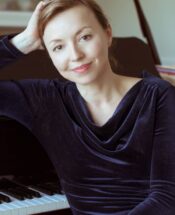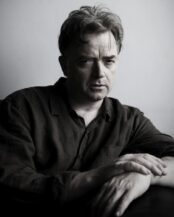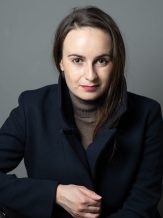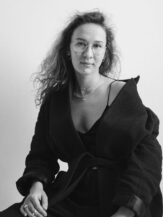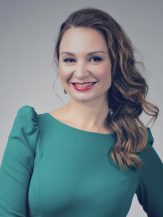Elena Langer
ARIADNE
Subscribe to our newsletter and be the first to know about our events, broadcasts, and discounts only for our followers!
Elena Langer (1974 - )
Elena Langer is a Russian-born British composer renowned for her vibrant, dramatic, and often humorous works in opera, vocal, and orchestral music. She studied piano and composition at the Tchaikovsky Conservatory in Moscow, then continued her composition training in London at the Royal College of Music and the Royal Academy of Music.
Langer’s rise in the operatic world began when she became the first Jerwood Composer in Association at London’s Almeida Theatre, where she created her early chamber operas, including Ariadne (2002) and The Girl of Sand (2003), both with librettos by Glyn Maxwell. Her prominent operas include The Lion’s Face (2010), Four Sisters (2012), and Figaro Gets a Divorce (2016), the latter of which was noted by The Daily Telegraph as “a modern opera that exerts an immediate emotional impact.”
Langer’s works have been performed at prestigious venues, including the Zurich Opera, Carnegie Hall, the Grand Théâtre de Genève, the Welsh National Opera, Shakespeare’s Globe, and Boston’s Symphony Hall. She also wrote the much-loved vaudeville Rhondda Rips It Up! (2018), described by The Times as “bursting with irreverent joy”.
Recorded collections of her work, such as "Landscape with Three People" (released in 2016 on Harmonia Mundi), showcase her wide emotional range—from sardonic wit to surreal lyricism.
“Aruadne” (2002)
This is a 15–minute mono‑opera for soprano, oboe, and string trio, with a libretto by poet Glyn Maxwell. Commissioned by the Almeida Opera Festival, it debuted in 2002 and has been performed at Tanglewood and the Aldeburgh Festival.
In Maxwell’s poem, Ariadne to Theseus, a loose version of Ovid, words and language are the metaphors for loss as Minos’s daughter writes an unsent, unsendable letter to the lover who so abruptly and inexplicably abandoned her; the landscape itself creates letters and words (the O of the horizon, the A of a distant sail, the sea’s tracings on the sand) to second her lament.
The work unfolds through Ariadne’s emotional landscape after being abandoned by Theseus on the shores of Naxos. Langer captures her sense of isolation and heartbreak in an intensely dramatic and musically atmospheric journey, closing with a haunting, dream‑like hallucination of her lover’s voice.
Cello: Kristina Blaumane
Oboe: Nicholas Daniel
Soprano Solo: Anna Dennis
Viola: Meghan Cassidy
Violin: Roman Mints
Composer: Elena Langer
Ariadne to Theseus
As blank as the white page before there falls
The print of loss, so were the sheets I rose
To find this morning, and the roar of shells
Was all my voice, Theseus -
Sleep vaulted the horizon, and the moon
Was sorry to be seen. On the cold shore
I echoed every rock that told me Gone -
My tangled hair, Theseus
Would not have let you from its labyrinth.
And the first letter of this far lament
Was A on a blank page, a sail's length
No more. The wind, Theseus,
Lit up my eyes like candles, and like flame
I stood, I was blown back, I stood again.
The waves crept back and left behind your name
Spelt on the sand, Theseus,
And in the mountain ridges of the sheets
Of our lost kingdom where I reign alone.
Nobody journeys here, I scale the heights
And the horizon, Theseus
Is all I see: a line that forms a ring
Forever and forever utters O.
What horrors prowl that circle? There's no string
For me to follow, Theseus
Out of such a place. Only to go
From all the world, as you from all of mine,
I dream of. A kept vow, a broken vow,
Each is a chain, Theseus
And in the grinding of the green salt sea
You hear me roam my island like the beast
You left for dead. I love you. Now the sky
Darkens the east, Theseus,
Darkens the shore, shortens the little page
I beat upon, and how I meet the end
Is all that's left untold, a ragged edge
For the undersigned Ariadne
About the Music & Background
Ariadne was commissioned by the Almeida Theatre in London, where Elena was composer-in-residence.
This 15-minute monologue, first performed at the Almeida Festival in 2002 alongside the première of Jonathan Dove’s L’altra Euridice, was a notable event for many reasons, perhaps the most influential in the long run being that it was her first collaboration with the poet Glyn Maxwell and the soprano Anna Dennis, both of whom – along with Russian violinist Roman Mints, for whom she had already in 1999 written the violin-and-orchestra Platch (Lament) – have had a great influence on her work.
Elena’s signatures, too, are clearly written here: the melodies that sketch harmonies in the air, a shifting interplay of solo voices whose delicate counterpoint exoticises a surprisingly familiar tonal landscape; characteristic trills, glissandos, and scurryings that add pleasantly alien accents. The most persistent melodic contour is the rising minor sixth that calls on the absent Theseus, introduced by the oboe at the start – an interval that has encapsulated romantic yearning from the days of Handel and Mozart.
The settings of Maxwell’s verses range freely through Ariadne’s emotions, from panicked agitation through trancey dreaming to the shifting sands of wandering, double-stopped glissandos that paint the wind and the emotional quicksand Ariadne stands on.
Beyond that rare bit of word-painting, the landscape is wholly emotional, and the musical thread that winds through the piece leads not out of the labyrinth but to the hopelessness of an unheard “I love you” and the hallucination of a lover’s voice, to an unearthly conclusion where multiphonic oboe harmonics and a violin evaporating into the ether decorate an extended perfect cadence.
Creators
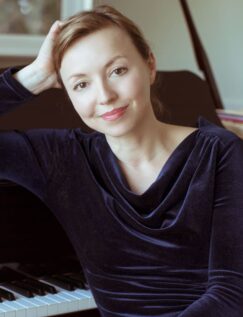
Elena Langer
Composer
Elena Langer is a prolific composer of colourful, dramatic, and often humorous music, familiar to audiences across Europe and America through her operatic, vocal, and orchestral pieces. Elena’s 2016 hit for Welsh National Opera, Figaro Gets a Divorce (receiving a new production at the Royal Swedish Opera in Stockholm in 2026) was described by Rupert Christiansen in the Daily Telegraph as “that rare thing: a modern opera that exerts an immediate emotional impact”. Her WNO follow-up, the 2018 vaudeville Rhondda Rips It Up!, was wildly popular with audiences across the UK, The Times describing it as “bursting with irreverent joy”. Her recent cantata, The Dong with a Luminous Nose, was warmly reviewed in The Times: “Langer manages to uncover the sadness of lost love lurking beneath the poem’s whimsy”.
Her new opera To Die For [A Comedy] will be co-produced by the Netherlands Reisopera in Holland and the Buxton International Festival in the UK in 2026. Based on the 1928 play The Suicide by Nikolai Erdman, it is an exuberant and subversive black farce whose message is that while life may be chaotic and cruel, lived amid absurdity and horror, the alternative is almost certainly worse. A new version of Elena’s comic opera Four Sisters (initially commissioned by Dawn Upshaw for Bard College) is to be performed at Covent Garden in spring 2026.
Elena Langer studied at the Tchaikovsky Conservatoire in Moscow and at the Royal Academy of Music in London. Her works have been performed at Zurich Opera, Carnegie Hall, the Grand Theatre Geneva, Opera National du Rhin, Strasbourg, Welsh National Opera, Shakespeare’s Globe, Hong Kong Academy of Arts, the Linbury Theatre at Covent Garden, the Tokyo Theatre, and Boston Symphony Hall.
Landscape with Three People, a CD of Elena’s vocal and chamber pieces, was released by Harmonia Mundi in 2016. Richard Morrison in The Times wrote: “She can do sardonic astringency but also evoke surreal otherworldliness or romantic yearning. It all depends on her chosen texts to which she responds in meticulous detail”. Landscape with Three People was performed in 2022 at the Oxford Lieder Festival.
The orchestral suite created from Figaro Gets a Divorce was premiered by the Seattle Symphony Orchestra, conducted by Maxim Emelyanychev, in 2020; subsequently, Anna Rakitina conducted it with the Boston Symphony and the Yomiuri Nippon Symphony Orchestra. There have been further performances by Gergely Madaras and the BBC Scottish Symphony Orchestra, Sir Mark Elder with the Hallé Orchestra, and Nicholas McGegan with the Cleveland Orchestra, among others.
The Dong with a Luminous Nose, a setting of the Romantic nonsense-poem by Edward Lear for chorus, orchestra, and cello, was co-commissioned by the London Philharmonic Orchestra and Boston Symphony Orchestra. The LPO premiered the work under Andrey Boreyko at the Royal Festival Hall in March 2023, and in March 2024, Sir Mark Elder conducted the American premiere at Symphony Hall. In autumn 2024, the work was performed by the Royal Scottish National Orchestra.
The oboist Nicholas Daniel commissioned and premiered Elena’s Gluhwein Concerto with Deutsche Kammerakademie Neuss am Rhein in 2022, and a new song cycle, Love & Endings, for soprano, oboe, and harpsichord, was performed by Nicholas, Anna Dennis, and Mahan Esfahani in April 2023 at Aldeburgh.
Three new song cycles are going to be premiered in 2025: Nice Weather for Witches, for mezzo, piano, and dancers, and Two Mandelstam Songs for tenor and piano, at the Oxford International Song Festival in October 2025; and Fabulous Beasts, to be performed by the counter-tenor Hugh Cutting at the Wigmore Hall in December 2025. Elena’s new piano solo piece, Seasons (based on Tchaikovsky’s The Seasons, and performed alongside it), was commissioned by the London Piano Festival to celebrate its tenth anniversary in October 2025. A new trumpet concerto, The Day the Sun Came Round for Tea, will be performed by Ben Wright and Pro Arte Chamber Orchestra of Boston in autumn 2025.
Her recent orchestral piece, Leonora’s Dream, will be performed in Stuttgart under the baton of Andrei Boreyko in May 2026. Elena is also working on a new large orchestral piece for the Royal Scottish National Orchestra, to be premiered in March 2026, and on a new violin concerto for Julian Rachlin and Philharmonisches Staatsorchester Hamburg, to premiere in 2027.
Tatiana Chudova
Composer
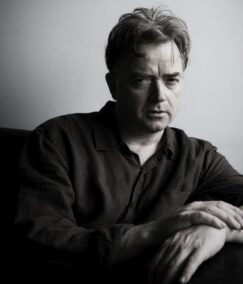
Glyn Maxwell
Poet
Born in England to Welsh parents, Glyn Maxwell was educated at Oxford University and Boston University, where he studied both poetry and theater with Derek Walcott. This simultaneous training in two disciplines has enabled him to create innovative work across genres. Maxwell has written numerous verse plays as well as long narrative poems. His many poetry collections include Pluto (2013); One Thousand Nights and Counting: Selected Poems (2011); Hide Now (2008); The Nerve (2002), which won the Geoffrey Faber Memorial Prize; and Out of the Rain (1992), which won the Somerset Maugham Award. His first three volumes of poetry are collected in The Boys at Twilight: Poems 1900–1995 (2000). Three of his poetry collections have been short-listed for the T.S. Eliot Poetry Prize, and two have been short-listed for the Whitbread Poetry Prize. His poetry has been anthologized widely, in The Penguin Book of the Twentieth Century in Poetry (1999) and The Firebox: Poetry in Britain and Ireland after 1945 (1998), among others. He also published a guidebook, On Poetry, in 2012.
Influenced by Robert Frost and W.H. Auden, Maxwell crafts formally assured poetry that follows the breath of everyday speech. Joseph Brodsky praised his first collection, Tale of the Mayor’s Son (1990), with the observation that “Glyn Maxwell covers a greater distance in a single line than most people do in a poem.” Maxwell’s book The Sugar Mile (2005), a verse narrative set in a Manhattan bar a few days before September 11, 2001, weaves together several voices and stories exploring the nature of fate. Time’s Fool: A Tale in Verse (2000) updates the Flying Dutchman story in 400 pages of strict terza rima. Explaining his reason for choosing such a challenging rhyme structure, Maxwell said in an interview for The Atlantic, “Terza rima approximates to thought, or the place where two elements—thought and light—connect. The first line of a terza rima is already an echo—it’s an echo of the middle line from the stanza before—so it’s a thought that’s being processed, using rhyme as a metaphor for thought.”
Maxwell’s critically acclaimed plays, about half of which are in verse, have been performed across the United States and Great Britain. He has also written opera libretti and fiction. His first novel, Blue Burneau (1994), was short-listed for the Whitbread First Novel Award. Moon Country (1996) is an account of his visit to Iceland with the poet Simon Armitage, tracing the travels of W.H. Auden and Louis MacNeice.
A Fellow of the Royal Society of Literature and the Welsh Academy, Maxwell has won the E.M. Forster Award from the American Academy of Arts and Letters and the Eric Gregory Award. He was poetry editor of the New Republic from 2001 to 2007, and he has taught at Amherst College, Columbia University, The New School, and the University of Essex.
Glyn Maxwell
Libretto
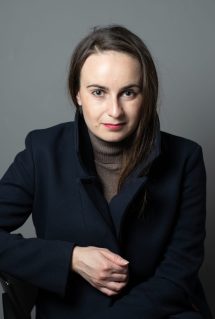
Elizavrta Korneeva
Stage director
Elizaveta collaborates with the Krasnoyarsk State Opera and Ballet Theatre, the Bashkir State Opera and Ballet Theatre, the Tchaikovsky Moscow State Conservatory, the independent Moscow-based company Montecchi vs Opera, the Moscow International House of Music, the Helikon-Opera Theatre, the Stanislavsky and Nemirovich-Danchenko Moscow Music Theatre (within the framework of a festival), the Bolshoi Theatre of Russia (within the framework of a festival), the State Opera of Hanover (Germany), and the Grand Théâtre de Genève (Switzerland). She is also a recurring collaborator with Lyrica Classic, an international organization dedicated to the promotion of contemporary classical music.
She was a nominee for the Golden Mask National Theatre Award in 2022, as well as for the Onegin Opera Award, and is the winner of three nationwide competitions for young directors organized by the Russian Cultural Foundation. She won the 4th International Competition for Young Opera Directors Nano-Opera, held by Dmitry Bertman, and participated in the Creative Laboratory for Young Directors under the leadership of Alexander Petrov.
In 2021, Elizaveta collaborated with the State Opera of Hanover (Germany) and the Grand Théâtre de Genève (Switzerland).
She regularly works with the independent theatre company Montecchi vs Opera and serves as stage director of the Russian Opera Festival in Taltsy (Irkutsk).
Currently, she is working on new productions at the Bashkir State Opera and Ballet Theatre, Helikon-Opera, and the Mariinsky Theatre.
Elizaveta Korneeva
Stage Director
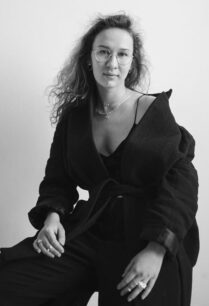
Julia Orlova
Set Designer
Julia Orlova is a multidisciplinary artist working at the intersection of theatre, opera, film, video art, performance, fashion, and 3D concept design. With a background in graphic arts and art history, she brings a deeply visual, conceptual, and emotionally charged language to each project. A graduate of the Moscow University of Printing Arts and the Russian State University for the Humanities, she further specialized at the Moscow Film School in art direction and contemporary cinema.
Julia integrates scenography, video art, and dramaturgy into a unified visual dramaturgy that treats space, rhythm, image, and movement as interdependent elements. Her approach emphasizes atmosphere as narrative — creating immersive environments where silence, texture, and light hold as much expressive power as words.
Her creative process is rooted in collaboration, working closely with directors and choreographers to shape space in tandem with movement and emotional intention. Her fascination with the body's memory, rhythm, and vulnerability drives her exploration of physical storytelling.
Technically fluent in 3D modeling and digital concept design, she develops detailed virtual environments to prototype mise-en-scène and test spatial interactions in real time — creating a dynamic feedback loop between visual form and performance from the earliest development stages.
Nature — vast, indifferent, and sublime — is central to her artistic world. A devoted hiker and traveler, Julia infuses her designs with the rhythms and geometries of the natural world: the silence of open plains, the geometry of mountains, the trace of wind. These sensorial impressions are translated into the emotional architecture of her work.
Her projects have been presented at leading venues including the Diaghilev Festival, Alexandrinsky Theatre, Kolobov Novaya Opera, Zaryadye Hall, Perm Opera and Ballet Theatre, and the Zotov Centre. Her opera and performance designs for Persephone and De Temporum Fine Comœdia have received multiple Golden Mask Award nominations and critical acclaim. In the fields of film and fashion, her visuals have been recognized at the Berlin Fashion Film Festival, ESMoA Video Art + Film Festival, and BODYSCOPE Festival.
Marked by early childhood experiences of silence and emotional sensitivity, Julia’s work is shaped by a desire to transcend language — to create poetic, transformative spaces where perception slows, deepens, and expands. She continues to explore the thresholds between disciplines and consciousness, building living structures of image, motion, and emotion — spaces of reflection, vulnerability, and radical presence.
Julia Orlova
Set Designer
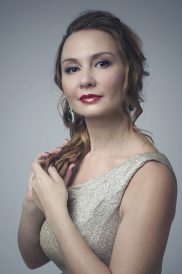
Yulia Petrachuk
Producer and art-director of Lyrica Classic
Renowned for her dynamic presence in the classical music realm, Yulia Petrachuk is a Russian-American operatic soprano, an esteemed producer, and the creative force behind Lyrica Classic Entertainment. She takes pride in her role as the artistic director and producer of the notable contemporary classical music festival "Spread New Music to the World" and the innovative "Muffled Voices Festival," which showcases contemporary opera by female composers.
An alumna with honors from the Moscow State Tchaikovsky Conservatory in Russia and the Bern University of the Arts in Switzerland, Petrachuk made her international debut in 2010 at the Bern State Theatre with her performance in Prokofiev's "The Love for Three Oranges." Her artistic journey has led her to perform in prestigious venues across the globe, including Theater Biel, Ash Lawn Opera Festival, Dicapo Opera Theater and Carnegie Hall in New York, Opera Camerata in Washington, D.C., Smetana Hall in Prague, Musikverein and Wiener Konzerthaus in Vienna, among many others.
Petrachuk's repertoire of lyric soprano extends beyond the traditional, delving into contemporary opera and vocal music of the 20th and 21st centuries, with her repertoire featuring world and continental premieres. Notable performances include Vitaly Hubarenko's mono-opera "The Love Letters" and the soprano solo in Emmanuel Dubois's "Requiem for the Fallen" at Carnegie Hall, the titular role in a mono-opera adaptation of Strauss's "Elektra" by Richard Duenser in Austria and Germany, and Volkonskaya in Tatiana Chudova's chamber opera at Moscow International House of Music.
With a passion for elevating lesser-known music, Petrachuk founded Maryland-based nonprofit organization Lyrica Classic Entertainment, quickly receiving international acclaim for its superior music presentations. The company has made significant contributions to the arts, showcasing new and undiscovered works at renowned venues such as Carnegie Hall, the Kauffman Music Center, the Strathmore Hall, the Congress Hall in Graz, the Moscow Catholic Cathedral and International House of Music.
Lyrica Classic's Spread New Music to the World festival gained recognition in 2023, having been nominated for "Best Project of the Year" by the International and European Association 2022 — a testament to Yulia Petrachuk’s impactful leadership and dedication to the arts.
In 2024, Yulia served as executive producer of the Muffled Voices Festival, highlighting the contributions of women composers in classical music. The festival was named a finalist for the International & European Association Award in the category of Best New Event and became the winner of the Global Recognition Award 2024 for its outstanding contribution to the global classical music scene, particularly in promoting underrepresented voices.
Yulia Petrachuk
Executive Producer

